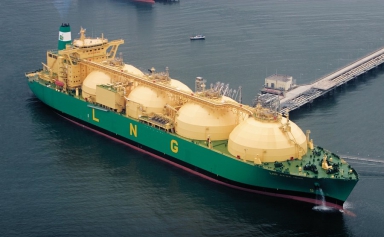Nigeria LNG Still Exporting
Nigeria LNG is continuing to produce and load cargoes for export, despite the forces majeures (FM) declared by Shell last week on most of its feed gas to the facility, as well as later also on its Bonny Light oil export terminal.
FM is a legal clause that allows an oil firm to stop supplies or shipments on specified grounds without being penalised.
Natural Gas World contacted Kudo Eresia-Eke, Nigeria LNG's general manager for external relations August 16 to obtain details on NLNG's production capacity and its reaction to the FM. He declined to comment on the gas 'leak' on Shell's Eastern Gas Gathering System (EGGS-1) given last week as the reason for failing to supply the bulk of its gas to Nigeria LNG.
Eresia-Eke did though say: "NLNG can confirm that FM has been declared on gas supplies from Shell Petroleum Development Company (SPDC) via the Eastern Gas Gathering System (EGGS-1). However, alternative sources of gas supply have enabled NLNG to continue production and loadings at Bonny."
But when asked to provide details of the number of cargoes still being loaded at Bonny, he stated that NLNG does not publicly disclose scheduling information. "We are unable to publicly share specific information regarding scheduling and loading for business reasons," he told NGW in an email.

The Bonny Island LNG terminal, with Bonny Gas Transport-owned tanker LNG Akwa Ibom berthed alongside (Photo credit: Shell)
No further statement was available from Shell, but a source indicated that the leak is still under investigation and that the FM will reduce the number of cargoes that NLNG exports and represents a setback for the country's industry.
A London-based LNG trader also told NGW August 18 that NLNG is still producing and exporting, estimating that shipments would be at roughly half normal volume – given that Shell typically provides about half of the feed gas into the NLNG liquefaction complex.
Separately, it was reported mid-August that manning levels and wage scales for officers on LNG vessels owned by Bonny Gas Transport will be reduced, as from September 1. The decision, according to NLNG, is to "minimize need for staff layoffs or retrenchment", as has been the case in several companies in the industry in response to the steep decline in revenues.
Oil and gas pipeline leaks seem to be on the rise in Nigeria. When SPDC declared FM on Bonny Light oil exports this May, it led to a 400,000 barrels/day loss in Nigeria's petroleum production; that FM was rescinded in July only to be reimposed on August 12. Shell's other oil export terminal, Forcados, has been subject to FM since February.
Omono Okonkwo


